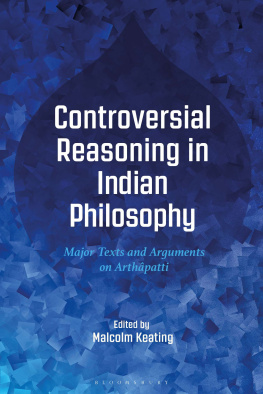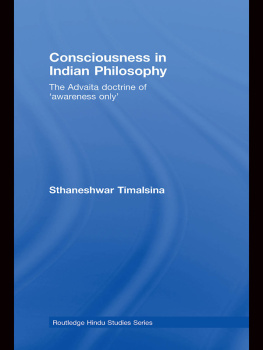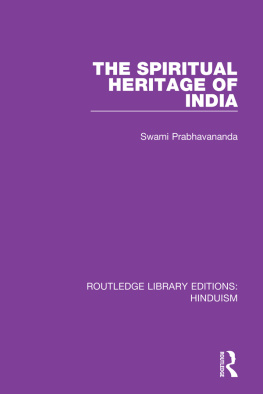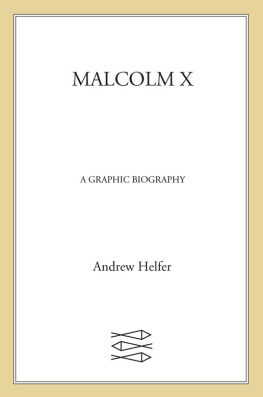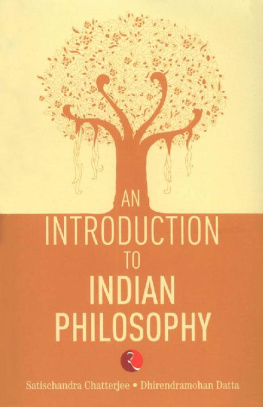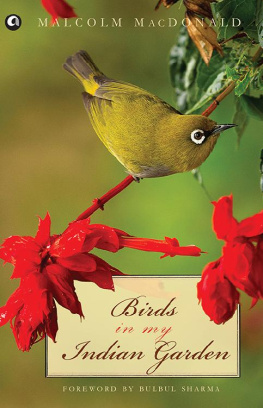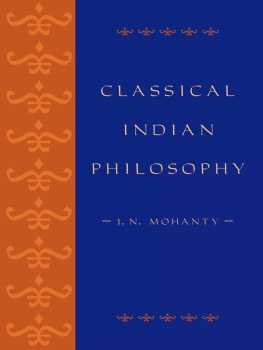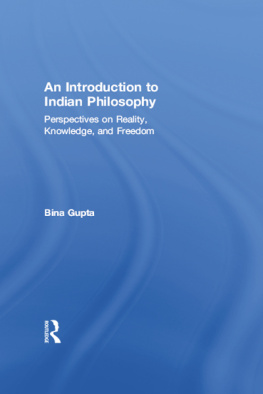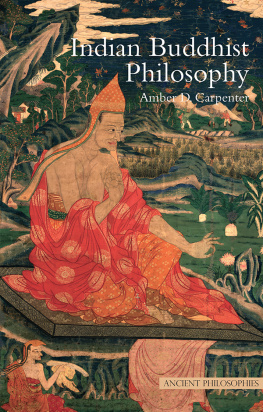Keating Malcolm - Controversial Reasoning in Indian Philosophy
Here you can read online Keating Malcolm - Controversial Reasoning in Indian Philosophy full text of the book (entire story) in english for free. Download pdf and epub, get meaning, cover and reviews about this ebook. year: 2020, publisher: Bloomsbury Publishing Plc, genre: Religion. Description of the work, (preface) as well as reviews are available. Best literature library LitArk.com created for fans of good reading and offers a wide selection of genres:
Romance novel
Science fiction
Adventure
Detective
Science
History
Home and family
Prose
Art
Politics
Computer
Non-fiction
Religion
Business
Children
Humor
Choose a favorite category and find really read worthwhile books. Enjoy immersion in the world of imagination, feel the emotions of the characters or learn something new for yourself, make an fascinating discovery.
- Book:Controversial Reasoning in Indian Philosophy
- Author:
- Publisher:Bloomsbury Publishing Plc
- Genre:
- Year:2020
- Rating:5 / 5
- Favourites:Add to favourites
- Your mark:
- 100
- 1
- 2
- 3
- 4
- 5
Controversial Reasoning in Indian Philosophy: summary, description and annotation
We offer to read an annotation, description, summary or preface (depends on what the author of the book "Controversial Reasoning in Indian Philosophy" wrote himself). If you haven't found the necessary information about the book — write in the comments, we will try to find it.
Controversial Reasoning in Indian Philosophy — read online for free the complete book (whole text) full work
Below is the text of the book, divided by pages. System saving the place of the last page read, allows you to conveniently read the book "Controversial Reasoning in Indian Philosophy" online for free, without having to search again every time where you left off. Put a bookmark, and you can go to the page where you finished reading at any time.
Font size:
Interval:
Bookmark:

IN INDIAN PHILOSOPHY
Also available from Bloomsbury
Indian Epistemology and Metaphysics
Edited by Joerg Tuske
Jewel of Reflection on the Truth about Epistemology
Stephen Phillips
Language, Meaning, and Use in Indian Philosophy
Malcolm Keating
The Bloomsbury Research Handbook of Indian Philosophy and Gender
Edited by Veena R. Howard
The Bloomsbury Research Handbook of Indian Philosophy of Language
Edited by Alessandro Graheli
The Philosophy of Sri Aurobindo
Edited by Debidatta Aurobinda Mahapatra

Summary of Positions on Arthpatti
Vtsyyanas Analysis of Pramas
Proof 1, ((C(AB))((CA)B)
Proof 2, (AcxLcx)((AcLch)x(Lcx(h=x)))
Comparison of Proofs 1 and 2
Caitra-arthpatti Truth Table
Proof 3, xy(AxLxy)xy((AxLxh)(Lxy(h=y)))
Proof 3, Part 2
Proof 3, Concluded
Proof 4, (AB)(AB)
Proof 5, x(Lcxy(Lcy(x=y)))(Lcy(Lcy(=y))
Comparison of Proofs 4 and 5
Two Versions of the Caitra-arthpatti
Basic Sources and Independent Means Debate
Epistemic Grounding vs. Epistemic Fundamentality
Nilanjan Das is a permanent lecturer at University College London. He mainly works on epistemology and classical Indian philosophy in Sanskrit (especially later Nyya). His articles have been published in the Journal of Indian Philosophy, Nos, the Review of Symbolic Logic, and Ratio.
Elisa Freschi is Assistant Professor of South Asian Philosophy in the Department of Philosophy, University of Toronto. Her main field of research is South Asian philosophy, especially deontic logic, epistemology, and philosophy of language and of religion in the Mms and Viidvaita Vednta schools. She is the author of two books: Duty, Language and Exegesis in Prbhkara Mms (2012) and, with Tiziana Pontillo, Rule-extension Strategies in Ancient India (2013). She has edited several volumes, most recently, with Elise Coquereau-Saouma, The Challenge of Postcolonial Philosophy in India (2018). Elisas research for this section has been supported by the WWTF fund MA 16_024.
Alessandro Graheli is Assistant Professor at the Department of Historical Studies, University of Toronto Mississauga, Canada. He is the author of History and Transmission of the Nyyamajar: Critical Edition of the Section on the Sphoa (2015) and numerous other publications, in his research areas of Nyya, textual criticism, philosophy of language, theories of knowledge, hermeneutics, aesthetics, and medieval bhakti.
Malcolm Keating is Assistant Professor of Philosophy at Yale-NUS College, Singapore. His research focuses on language and epistemology in Indian philosophy. He is the author of Language, Meaning, and Use in Indian Philosophy: An Introduction to Mukulas Fundamentals of the Communicative Function (2019) and articles in journals such as the History of Philosophy Quarterly, the Journal of Indian Philosophy, the Journal of Pragmatics, and Philosophy East & West.
Andrew Ollett is Assistant Professor of South Asian Humanities at the University of Chicago. He works on the literary and intellectual traditions of South Asia, including works composed in Sanskrit, Prakrit, Apabhramsha, and Kannada. His publications include Language of the Snakes: Prakrit, Sanskrit, and the Language Order of Premodern India (2017) as well as papers published in the Journal of Indian Philosophy, History and Philosophy of Logic, and the Journal of the International Association of Buddhist Studies.
Stephen Phillips is Professor of Philosophy and Asian studies at the University of Texas at Austin and has been a visiting professor of philosophy at the University of Hawaii, Mnoa and Jadavpur University, Kolkata. He has published numerous papers in scholarly journals and is author or co-author of twelve books, including Yoga, Karma, and Rebirth: A Brief History and Philosophy (2009); Classical Indian Epistemology: The Knowledge Sources of the Nyya School (2012); with N. S. Ramanuja Tatacharya, the perception chapter of Gageas fourteenth-century Tattva-cint-mai (2008); with Matthew Dasti, The Nyya-stra: Selections with Early Commentaries (2017), and a three-volume translation of the Tattva-cint-mai, Jewel of Reflection on the Truth about Epistemology (2020).
Mark Siderits teaches analytic Asian philosophy, having retired from Seoul National University in 2012, but is now lecturing regularly at Kyoto University. His research interests lie in the intersection between classical Indian philosophy on the one hand, and analytic metaphysics and philosophy of language on the other. His more recent publications include Personal Identity and Buddhist Philosophy: Empty Persons, 2nd edition (2015) and, together with Shry Katsura, Ngrjunas Middle Way: Mlamadhyamakakrik (2013). A collection of his papers on Buddhist philosophy, Studies in Buddhist Philosophy, was published in 2016.
Anand Vaidya is Professor of Philosophy at San Jose State University. From 1995 to 2005 he was trained as an analytic philosopher, encompassing the philosophy of language and logic, metaphysics, meta-ethics, normative-ethics, applied-ethics, epistemology, philosophy of mind, and the history of Western philosophy. While he continues to work on the epistemology of modality, essence, and grounding, since 2010 he has expanded his interests to the cross-cultural (especially Indian philosophy and Anglo-Analytic philosophy) and multi-disciplinary (especially cognitive science and psychology) study of the mind, the ways of knowing about reality, and critical thinking. He is also interested in the capabilities approach to justice, and core topics in social justice, such as mass incarceration and disability rights.
Kiyotaka Yoshimizu is a former professor at Tohoku University and his main field of research is Mms and its related fields. Some of his recent publications include Der Organismus des urheberlosen Veda. Eine Studie der Niyoga-Lehre Prabhkaras mit ausgewhlten bersetzungen der Bhat (1997); Kumrila niyoru Shky to shiteno Bukky Hihan (Kumrilas Denunciation of Buddhism as a Heresy from the Viewpoint of the Sources of Dharma) (2015); Tolerance and Intolerance in Kumrilas Views on the Vedic kh (2016); Tradition and Reflection in Kumrilas Last Stand against the Grammarians Theories of Verbal Denotation (2012); and Kumrilas Reevaluation of the Sacrifice and the Veda from a Vednta Perspective (2007).
This book is designed to introduce readers to a controversy in Indian philosophy over reasoning. It starts with one side, the Mmsakas, follows their arguments through time, and then moves to the other side, the Naiyyikas, with the same chronological approach. That discussion then continues in the essays which draw on the Sanskrit source materials and, with them, engage in constructive philosophical work. Thus, for readers new to Indian philosophy and its dialectics, begin with the Introduction which will give you relevant conceptual context for entering into the discussion. From there, depending on your interests, you can move into the source material directly or begin by reading the essays which examine the philosophical implications of the debate.
Next pageFont size:
Interval:
Bookmark:
Similar books «Controversial Reasoning in Indian Philosophy»
Look at similar books to Controversial Reasoning in Indian Philosophy. We have selected literature similar in name and meaning in the hope of providing readers with more options to find new, interesting, not yet read works.
Discussion, reviews of the book Controversial Reasoning in Indian Philosophy and just readers' own opinions. Leave your comments, write what you think about the work, its meaning or the main characters. Specify what exactly you liked and what you didn't like, and why you think so.

